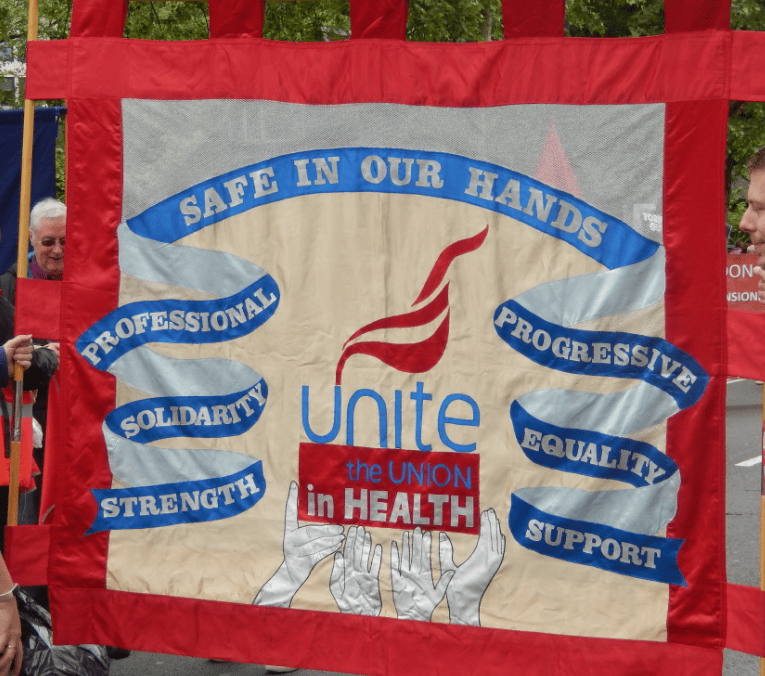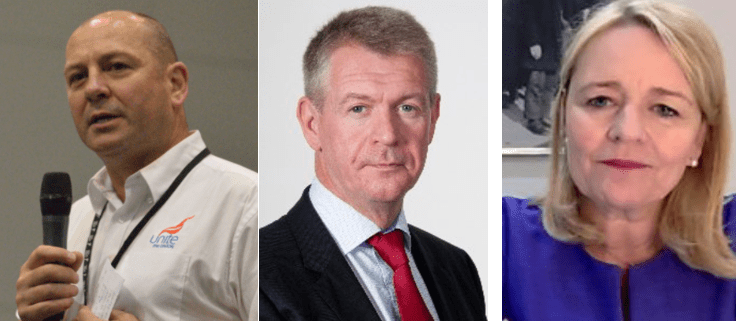The selection of a new General Secretary for Unite the union in 2021 is a hugely significant event for the whole labour movement. Unite has the second largest membership of any trade union, with over a million members in a wide range of industries, such as manufacturing, transport, public services and utilities and health. It has the largest affiliated membership to the Labour Party. So the election of the general secretary position is not just significant for individual members of Unite; it is significant for the wider labour movement.
Of the three candidates still in the race, Steve Turner, Sharon Graham and Gerard Coyne, the one most likely to continue the radical stance of the union is in our opinion Steve Turner and it is important that socialists and activists support him and work for his election. Since nominations closed, the fourth candidate, Howard Beckett stood down in favour of Turner and their combined total amounted to 61% of all of the nominations. However, nominations are not the same as votes, and it is important that there is a broad campaign for the left candidate most likely to keep out the right wing, and that is Steve Turner.
The current general secretary, Len McCluskey, was elected in 2010 with 101,000 votes and then re-elected in 2013, with a much-increased vote of 145,000. He is from a solid working-class background in Liverpool and was generally seen to be on the left, supporting Jeremy Corbyn in his bid to become Labour leader and then afterwards. In the 2017 general secretary election, however, McCluskey was run very close by the right-wing challenger, Gerard Coyne, and only narrowly won, with 59,000 votes against 53,500.
Unite voted against ‘Open Selection’ in 2018
Unfortunately, Len McCluskey has been sometimes inconsistent in supporting left policies in the Labour Party. In the vote for ‘Open Selection’ of Labour Party parliamentary candidates at the Labour conference in 2018, his Unite delegation voted against, although it is union policy from previous union conferences.
Nevertheless, in the past year or so, under McCluskey’s leadership, Unite has correctly criticised the failure of Labour under Keir Starmer to offer a serious alternative to the crisis facing the union’s members and facing the working class generally. Starmer and the new right-wing leadership of the Labour Party, would love to see the Unite general secretary position move into the hands of “their” candidate, which is once again Gerard Coyne. The Guardian calls Coyne the “mainstream candidate” because, as usual, they’re not honest enough to call out the clear differences between left and right.
There should not really have been any threat to the continuation of a left leadership in Unite. However, despite the odd flourish from McCluskey, he has not been sufficiently vigilant in maintaining a strong layer of activists in the union and this factor alone presents a threat to the left. The decline in McCluskey’s vote from 2013 to 2017 is indicative of the decline in branch activity.
It is a poor reflection of the Unite left in general that so many branches are moribund and are effectively propped up by officials. Some of these half-dead branches are still used by officials to ‘nominate’ their favourite candidates. It is no surprise, therefore, that re-engagement of members and the revitalisation of branches are things that feature strongly in the campaign material of all three remaining candidates.
Some branches had lively hustings
When the nominations for general secretary finally closed, we started with three ‘left’ candidates. The right-wing hopeful, Gerard Coyne, easily exceeded the required minimum, gaining 196 nominations (14% of the total). Up to the point when Coyne received the required number of nominations, the other three candidates were able to outline their different visions for the union and this led to some very lively hustings meetings, where in some cases Sharon Graham, Steve Turner and Howard Beckett all turned up to answer questions.

Prior to the closure of nominations, Steve Turner had won the backing of the United Left nationally, beating Howard Beckett, although only narrowly. Having said that, there were also disputes about who was and who was not allowed to participate and vote in the United Left hustings and as an organised ‘broad left’, which it claims to be, it is far from being as open, transparent and democratic as it ought to be.
Howard Beckett had built up a reputation for speaking out clearly on a number of issues affecting the union and arguing for socialist policies in the Labour Party. He is probably the most articulate left on Labour’s NEC – although that should read ‘was’ because he is suspended at the moment on some flimsy pretext. His outspoken criticisms of Starmer led to Beckett winning the support of many left-wing individuals and branches during the nominations campaign. He got a massive 200 branch nominations in Scotland. Turner’s support, on the other hand, seems to be based on the more traditional left, around the Morning Star and other left groups.
Graham’s campaign slogans leave a lot to be desired
Sharon Graham chose not to participate in the United Left, preferring to be seen as separate from it; indeed, her ‘standing out’ from the rest has been the main focus of her campaign. She still claims to be on the left and that is supported also by some on the left in the labour movement.
Now that nominations are closed and the union is moving into the voting phase, it is important that attention is focused on building a credible campaign to stop the right wing. Although there are some good left members of the union who support Sharon Graham, having got fewer than a quarter of the total nominations, she is unlikely to beat Gerard Coyne and, in any case, some of her campaign slogans leave a lot to be desired. Her main slogan, “Let’s get back to the workplace” sounds good in practice, but she has adopted what can only be described as an “anti-political” stance, describing the other remaining candidates as being part of the “Westminster brigade”, as if the union should not engage in political campaigns to help members.

It is self-evident that the union foundation is in the workplace, and it is here that the main functions of the union are played out – fighting for members’ wages and conditions, week-in and week-out. But there are many ‘political’ issues that impinge on union activity and members’ rights – like anti-trade union legislation, health and Safety legislation, minimum wage legislation, and many more – all of which demand a political stance by the union. Unite members cannot afford for the union to be anti-political and activity in the workplace and a political stance are not mutually exclusive.
Right wing candidate wins enough nominations
Given that the right-wing candidate, Coyne, got only 14% of the nominations, it might appear that there is little risk of him winning. However, using the votes from 2017 as a guide, it appears that the right-wing deliver more votes per nomination than the left – some estimates suggest that Coyne could get as many as 300 votes per nomination, compared to 50 per nomination for the left candidates – and therefore the danger of a right-wing victory cannot be underestimated. If Sharon Graham stays in the race, she is not likely to win, while at the same time she is taking the risk of allowing a victory to the right-wing candidate.
It is important that as far as possible, the votes of the left should be concentrated in a single candidate against Coyne. Although at first it had looked as if all three left candidates may have stayed in the race, Howard Beckett took the very commendable step of pulling out of the contest and endorsing Turner. Beckett and Turner have now put forward a joint statement, a “blended manifesto” which “recognises the central importance of organising and leverage to winning for members in struggle and building the union.”

In our opinion, there is still much that should be added to this manifesto. It is not just that the active layers and branches should be revised: there needs to be root and branch change in the democratic structures of the union. It is unacceptable that there is only one single full-time position in the union that is elected – the general secretary.
Socialists should fight for all union officials to be elected by the members they represent, like shop-floor reps, and should be paid only the average wages of a skilled worker. Socialists should give their support to Steve Turner in this election, but it cannot be uncritical support, because important elements that are necessary to improve democracy in the union are still not present, even in the joint manifesto.
Making the union more accountable and responsive
As for those on the left who still support Sharon Graham, we should say that there is still time for her to withdraw and to add some of her ideas to the joint manifesto of Beckett and Turner. The best option for the members was always for the three left candidates, Beckett, Turner and Graham, to come to some agreement to stand behind a single one of their number, and it is not too late to do that. They could play an important role in catalysing a discussion in the union about making it more accountable and responsive to lay members.
Given the challenges to members’ living standards, jobs and conditions at work, Unite need a democratic, militant union, fighting union, willing and able to struggle on behalf of its members, to defend and indeed, improve, their living standards. If the right-wing win this general secretary contest, it will mean the union will shift to the right politically and it will become far less likely to respond to the needs of its members in the workplace. With everything that is at stake, in the industrial and political wings of the labour movement, therefore, we urge all Unite members to vote and to campaign for Steve Turner.



